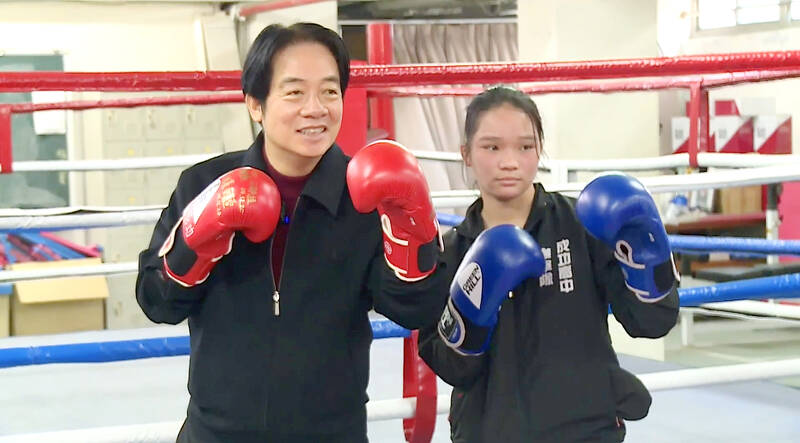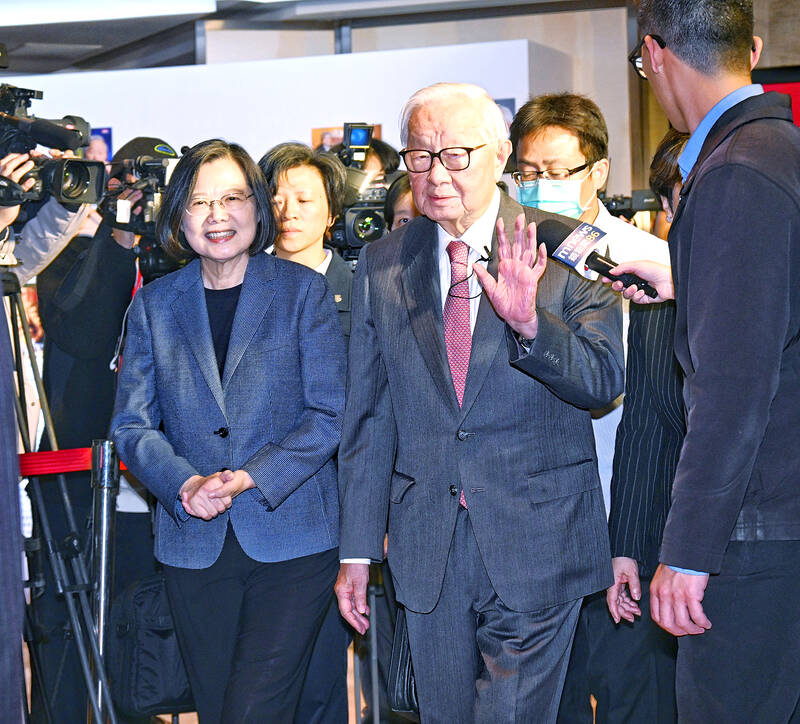Something strange happened in former president Tsai Ing-wen’s (蔡英文) second term: She remained popular. According to My-Formosa.com polling at the time, she scored high on trustworthiness and satisfaction with her governance spiked at the beginning of her second term, then in the remaining three years stabilized into a range of the upper forties to mid-fifties.
This is especially remarkable since her second term was marred by several scandals, which resulted in an electoral drubbing for the Democratic Progressive Party (DPP) in the 2022 local elections — the worst result since the party’s founding.
Most politicians around the world would salivate at such high numbers maintained for so long. It is also unusual in Taiwan’s democratic era.

Photo courtesy of the Presidential Office
In both the Chen Shui-bian (陳水扁) and Ma Ying-jeou (馬英九) presidencies their ratings started high, but declined over time, with both deeply unpopular by the end of their presidencies.
Ma famously dropped to a trust rating of 9.2 percent in one poll and a approval rating of 9.7 in another poll, though both were outliers and most polling had him in the upper teens or lower twenties.
Tsai followed the same pattern through the first half of her first term, hitting rock bottom the same month as the 2018 local elections, which the DPP lost badly. Voter trust had sunk to 20.9 percent and her approval ratings stood at only 24.7 percent.

Photo: Fang Pin-chao, Taipei Times
Curiously, according to a different pollster (My-Formosa.com did not exist yet), her trust ratings were roughly similar to Ma’s at a similar point in his first term, but Ma’s governance satisfaction was fairly high, in the mid-forties.
After hitting rock bottom in November 2018, something rarely seen in any democracy and never in Taiwan’s democratic history: Her popularity rose…and rose…and rose, peaking just after her re-election in January 2020. Trust peaked in March 2020 at 68.8 percent and her approval ratings in April at a stunningly high 70.3 percent.
COMPARING LAI AND TSAI
President William Lai’s (賴清德) trust ratings are also high.
His lowest point was a still high 52.5 percent in September, his high of 58 was in August and at the end of last month stood at 54.5 percent.
His approval rating stood at only 45.2 in May, but he had only just been inaugurated and there was a very high number of people expressing no opinion. It broke 50 percent in July and at the end of last month was a healthy 53.4 percent.
These numbers are within the range of the last three years of Tsai’s presidency.
There are three possibilities here: either he is personally popular, there is something structural going on and he is carrying on the same popularity as Tsai or a bit of both.
He has long been one of the most popular politicians in Taiwan, and for long periods polling showed him the most popular. He has won every general election he has run in since his first ever run in 1996, and only ever lost in a primary — defeated by Tsai in 2019 in what turned into a very ugly fight.
His high popularity even won him the nickname “the God Lai” (賴神), and though it has been used less since he served as premier, it still appears in headlines from time to time.
He gained the nickname and won over much of the country in a long, tough battle against a corrupt Tainan city council speaker election winner, which he ultimately won. The Tainan City Council is notoriously corrupt on both sides of the political aisle.
However, his popularity is not as astronomical as it was. Being premier for part of Tsai’s first term inevitably means being a punching bag and taking blame, rightly or wrongly, for anything that goes wrong domestically.
Additionally like most of the DPP these days he has extreme message discipline. That discipline means no gaffes, but also it means almost all DPP politicians — including Lai — come across as having about as much individual character as a parking lot.
In his younger days Lai displayed a lot of character, said controversial things and would even get angry and shout — sometimes using profanity. Now he is smooth, but rather bland. It is both hard to dislike him, or get excited about him.
Tsai’s poll numbers were also high for years, but she was not known for her charisma. She exuded a nerdy competence that had appeal, but it did not set people on fire.
In her case her high numbers do not appear to have been a result of her personal charisma, and it does not appear that this is much of a factor with Lai either.
Lai won the presidential election with only 40.05 percent of the vote. In the November Formosa poll, however, 46.9 percent supported him serving a second term.
He’s polling noticeably higher than either of those two numbers. Why?
WHAT THE NUMBERS REALLY MEAN
If his numbers remain in a similar range as they have been and were for Tsai in her last three years, this would suggest that something else is at play.
On Jan. 2, 2019, Xi Jinping (習近平) held a speech to commemorate the famous “Letter to Compatriots in Taiwan” of 1979. Xi reiterated the threat to use force against Taiwan, and for the first time appeared to tie the “1992 consensus” to “one country, two systems.”
This sent shockwaves through Taiwan, and all political parties condemned it. In March of that year, protests began in Hong Kong and continued for over a year, with the government turning to increasingly repressive and violent tactics against the brave protesters.
This was a campaign year in the runup to the January 2020 election, and the DPP very successfully campaigned on “resist China, protect Taiwan” (抗中保台). Tsai’s popularity rebounded throughout the year and she won re-election in a landslide.
The DPP tried to run on that slogan in the 2022 local elections, and it was a disaster. Local elections are about managing traffic and sewage systems, not national security, and the Chinese Nationalist Party (KMT) won in a landslide.
Tsai’s re-election, Lai’s election and their high ratings in the polls are likely in response to the trust the public puts in them on foreign policy, sovereignty and national security.
In Taiwan’s political system, those are the responsibilities of the president. In theory, domestic governance is the responsibility of the premier and the cabinet.
However, since the president appoints the premier, the president can get involved in domestic issues and previously presidents were blamed if things went wrong.
Now it appears that the public is giving credit and blame more along the lines originally constitutionally intended, and it does appear the premier does handle much of the day-to-day running of the country, so it may be fair.
Tsai’s foreign policies and handling of cross-Strait relations consistently polled very high, and Lai explicitly ran on maintaining those. It is these policies and stances that the high trust ratings are in response to, and the numbers reflect public confidence in Tsai, and now Lai, to safely implement them.
Under Tsai and continuing under Lai, relations with the rest of the world have improved markedly while Beijing has become increasingly threatening. The stakes became increasingly apparent and the threat more acute in Tsai’s second term.
This suggests that if Lai stays the course his polling will likely stay in a similar range as Tsai’s did, and he will likely win re-election.
Donovan’s Deep Dives is a regular column by Courtney Donovan Smith (石東文) who writes in-depth analysis on everything about Taiwan’s political scene and geopolitics. Donovan is also the central Taiwan correspondent at ICRT FM100 Radio News, co-publisher of Compass Magazine, co-founder Taiwan Report (report.tw) and former chair of the Taichung American Chamber of Commerce. Follow him on X: @donovan_smith.

June 2 to June 8 Taiwan’s woodcutters believe that if they see even one speck of red in their cooked rice, no matter how small, an accident is going to happen. Peng Chin-tian (彭錦田) swears that this has proven to be true at every stop during his decades-long career in the logging industry. Along with mining, timber harvesting was once considered the most dangerous profession in Taiwan. Not only were mishaps common during all stages of processing, it was difficult to transport the injured to get medical treatment. Many died during the arduous journey. Peng recounts some of his accidents in

“Why does Taiwan identity decline?”a group of researchers lead by University of Nevada political scientist Austin Wang (王宏恩) asked in a recent paper. After all, it is not difficult to explain the rise in Taiwanese identity after the early 1990s. But no model predicted its decline during the 2016-2018 period, they say. After testing various alternative explanations, Wang et al argue that the fall-off in Taiwanese identity during that period is related to voter hedging based on the performance of the Democratic Progressive Party (DPP). Since the DPP is perceived as the guardian of Taiwan identity, when it performs well,

A short walk beneath the dense Amazon canopy, the forest abruptly opens up. Fallen logs are rotting, the trees grow sparser and the temperature rises in places sunlight hits the ground. This is what 24 years of severe drought looks like in the world’s largest rainforest. But this patch of degraded forest, about the size of a soccer field, is a scientific experiment. Launched in 2000 by Brazilian and British scientists, Esecaflor — short for “Forest Drought Study Project” in Portuguese — set out to simulate a future in which the changing climate could deplete the Amazon of rainfall. It is

The Taiwan People’s Party (TPP) on May 18 held a rally in Taichung to mark the anniversary of President William Lai’s (賴清德) inauguration on May 20. The title of the rally could be loosely translated to “May 18 recall fraudulent goods” (518退貨ㄌㄨㄚˋ!). Unlike in English, where the terms are the same, “recall” (退貨) in this context refers to product recalls due to damaged, defective or fraudulent merchandise, not the political recalls (罷免) currently dominating the headlines. I attended the rally to determine if the impression was correct that the TPP under party Chairman Huang Kuo-Chang (黃國昌) had little of a